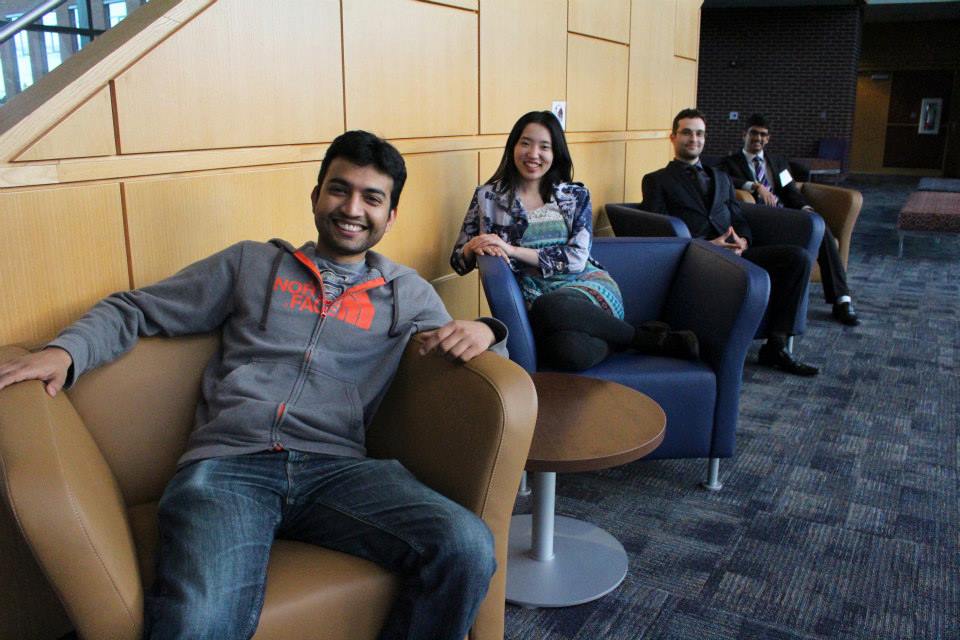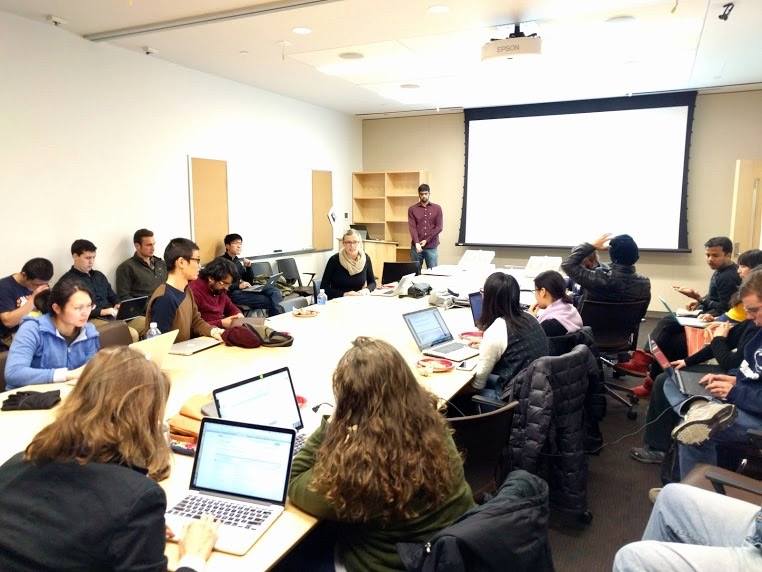Graduate school is definitely not easy. But did any of us really think that it would be?
Whether you’re reading this as a prospective, current, or former graduate student, or even perhaps as a family member or friend of a graduate student, you’ve undoubtedly heard about some of the trials and tribulations that graduate students face.
While I could write countless blog posts on how to survive the many hurdles that come with being a PhD student, I thought it would be better, and more well-rounded, to instead ask a bunch of graduate students what they thought. So, with the simple question of, “What advice do you have for prospective or younger graduate students?”, here are the answers I got:
On developing relationships/working with others:
Help: ask for it and hand it out – At some point, you’re going to need help. Whether that be with a lab protocol, having someone read over something you’ve written, having a labmate take care of your plants/animals/cells while you’re away, or analyzing your data, it’s going to happen. Science isn’t about individual pursuit, so building trusting relationships with your colleagues where you reciprocate help early on will help you be successful throughout your career.
ask for it and hand it out – At some point, you’re going to need help. Whether that be with a lab protocol, having someone read over something you’ve written, having a labmate take care of your plants/animals/cells while you’re away, or analyzing your data, it’s going to happen. Science isn’t about individual pursuit, so building trusting relationships with your colleagues where you reciprocate help early on will help you be successful throughout your career.
–Molly Hanlon, 6th year Plant Biology
 Make everyone a mentor — This isn’t limited to PIs. I see grad students doing great things on a large scale and even on the smaller scale in labs. Some of my labmates have great organizational skills, or I just really like their approach to doing work. I try to learn from all of these people and take the best from each of them to develop my own habits and practices. To do this, I remind myself that nothing I do is ‘the best’ and there’s always room for improvement.
Make everyone a mentor — This isn’t limited to PIs. I see grad students doing great things on a large scale and even on the smaller scale in labs. Some of my labmates have great organizational skills, or I just really like their approach to doing work. I try to learn from all of these people and take the best from each of them to develop my own habits and practices. To do this, I remind myself that nothing I do is ‘the best’ and there’s always room for improvement.
–Molly Hanlon, 6th year Plant Biology
Find a faculty mentor who isn’t your advisor. Ideally a disinterested party who isn’t relying on you to pump out papers.
–Anonymous
On time-management and work/life balance:
 Go to bed early, get up early, and get to lab early.
Go to bed early, get up early, and get to lab early.
Exercise! Preferably in the morning to get it out of the way.
Prepare your meals in advance.
This has all saved me time and allowed me to make time for my friends, which is an important aspect of graduate life.
–Kahina Ghanem, 3rd year Physiology
 Force yourself to take breaks. It is really easy to get sucked down the rabbit hole that is grad school because there is always something you can be working on. You need to set time aside to take a break, otherwise you’ll just get burnt out. So, take that extra time to go for a hike, watch some TV, or find a new hobby. There is no better time than grad school to find new hobbies.
Force yourself to take breaks. It is really easy to get sucked down the rabbit hole that is grad school because there is always something you can be working on. You need to set time aside to take a break, otherwise you’ll just get burnt out. So, take that extra time to go for a hike, watch some TV, or find a new hobby. There is no better time than grad school to find new hobbies.
–Stephanie Klein, 2nd year Plant Biology
 Set boundaries – One of the hardest things for an eager-to-please young graduate student to do is say no. A constant chorus of yeses, though, will soon leave you overwhelmed and struggling to keep your head above water. Knowing what to say yes to, though, requires a clear set of goals and a focused mentality to achieve them. You also have to have confidence in yourself that you’re going to come through on the things that your commit to.
Set boundaries – One of the hardest things for an eager-to-please young graduate student to do is say no. A constant chorus of yeses, though, will soon leave you overwhelmed and struggling to keep your head above water. Knowing what to say yes to, though, requires a clear set of goals and a focused mentality to achieve them. You also have to have confidence in yourself that you’re going to come through on the things that your commit to.
–Molly Hanlon, 6th year Plant Biology
 I think the most important skill to develop early on during your graduate career is time management along with strategic efforts towards your future career plans. For instance, if you hope to work in a certain industry, typically one that would not be a conventional academic route, it will be in your best interest to look for opportunities all while pursing your research goals, and internship are the most appropriate. So learning to balance your time in the lab as well as preparing yourself for future opportunities will be an important feat in graduate school.
I think the most important skill to develop early on during your graduate career is time management along with strategic efforts towards your future career plans. For instance, if you hope to work in a certain industry, typically one that would not be a conventional academic route, it will be in your best interest to look for opportunities all while pursing your research goals, and internship are the most appropriate. So learning to balance your time in the lab as well as preparing yourself for future opportunities will be an important feat in graduate school.
–Josephine Garban, 5th year Molecular Medicine
 Have “other” friends — Having hobbies really makes the ‘taking care of yourself’ thing a lot easier. It also helps you to interact with a more diverse group of people that aren’t also scientists. Talking with these friends has helped me contextualize my work and improve my communication skills: a political science PhD student isn’t going to immediately understand why researching plant root growth is important. Even if you don’t have active hobbies, having hobbies that allow you to interact with non-scientists can really help you improve your work and gain perspective. There are all sorts of things to do, so don’t be afraid to try something new and stick with it.
Have “other” friends — Having hobbies really makes the ‘taking care of yourself’ thing a lot easier. It also helps you to interact with a more diverse group of people that aren’t also scientists. Talking with these friends has helped me contextualize my work and improve my communication skills: a political science PhD student isn’t going to immediately understand why researching plant root growth is important. Even if you don’t have active hobbies, having hobbies that allow you to interact with non-scientists can really help you improve your work and gain perspective. There are all sorts of things to do, so don’t be afraid to try something new and stick with it.
–Molly Hanlon, 6th year Plant Biology
On funding opportunities:
From my experience, some departments may be unwilling to offer internal support to Huck students. I recommend that you speak early with representatives of the departments that you are interested in to find out if they are one such department and to talk to your potential PI about funding opportunities for external sources of funding.
– Anonymous
On teaching:
 The more time and effort you put in, the more rewards you get – Teaching requires much more work than just standing in front of students in the classroom. After becoming a lab instructor myself, I realized that the preparations (e.g. making teaching materials, designing quizzes and grading rubrics, etc.) and reviews (e.g. grading, answering questions from students, etc.) require way more work than I had imagined. However, there are a lot of great resources for teachers at any level at Penn State, like the Schreyer Institute for Teaching Excellence. Despite the heavy workload, at the end of teaching, you get to feel that teaching/mentoring isn’t that bad and actually something worth spending time on. Personally, I think hearing students’ saying ‘Aha! Now I got it!’ is the best reward as a teacher, and this experience will definitely bring you excitement and joy in teaching and curiosity towards different teaching methods. –Yurika Matsui, 5th year MCIBS
The more time and effort you put in, the more rewards you get – Teaching requires much more work than just standing in front of students in the classroom. After becoming a lab instructor myself, I realized that the preparations (e.g. making teaching materials, designing quizzes and grading rubrics, etc.) and reviews (e.g. grading, answering questions from students, etc.) require way more work than I had imagined. However, there are a lot of great resources for teachers at any level at Penn State, like the Schreyer Institute for Teaching Excellence. Despite the heavy workload, at the end of teaching, you get to feel that teaching/mentoring isn’t that bad and actually something worth spending time on. Personally, I think hearing students’ saying ‘Aha! Now I got it!’ is the best reward as a teacher, and this experience will definitely bring you excitement and joy in teaching and curiosity towards different teaching methods. –Yurika Matsui, 5th year MCIBS
 Must-do’s to survive your first time teaching — 1) attending a lab section/a lecture led by an experienced instructor, 2) picturing the entire lecture/lab period (starting from entering the lab/lecture room and ending with leaving the room) and planning two weeks ahead of time, and 3) rehearsing your lecture at least once at home. One fun advice I got from my own teaching mentor was ‘becoming an aunt/an uncle of your students, not a friend, parent or sibling.’ Because many graduate students are close in age to undergraduate students, it is sometimes difficult to know the appropriate personal distance to your students. This piece of advice nicely describes how we should interact with students while keeping the professional distance. –Yurika Matsui, 5th year MCIBS
Must-do’s to survive your first time teaching — 1) attending a lab section/a lecture led by an experienced instructor, 2) picturing the entire lecture/lab period (starting from entering the lab/lecture room and ending with leaving the room) and planning two weeks ahead of time, and 3) rehearsing your lecture at least once at home. One fun advice I got from my own teaching mentor was ‘becoming an aunt/an uncle of your students, not a friend, parent or sibling.’ Because many graduate students are close in age to undergraduate students, it is sometimes difficult to know the appropriate personal distance to your students. This piece of advice nicely describes how we should interact with students while keeping the professional distance. –Yurika Matsui, 5th year MCIBS
On choosing a lab/adviser:
 Talk to graduate students in the lab to better understand the “lab life”.
Talk to graduate students in the lab to better understand the “lab life”.
Look at what graduate students in the lab have published and also how long they take to graduate.
Talk with your adviser about time expectations – some PIs expect 70 hour work weeks while others do not care exactly how much time you spend in the lab as long as you are producing results.
Ask about potential projects you may be on – is the project set in stone or is there wiggle room for you to pursue your interests?
Think about what you want to do after graduate school – do you need to find a lab that offers a specific skill set for that profession? If not, are there alternative ways to get that skill set?
–Colleen McSweeney, 4th year Neuroscience
On communication:
 Communicate with your advisor. He/she is the one who mentors you since the very beginning of graduate school, and they know the best of what you are good at, or what you are fear of. Not to say the decades of mentoring experiences they have. Don’t be afraid to tell them what you are up to for your career, and you would get the best support you may not even able to imagine. In my case, since I am interested in outreach and science communication, Dr.Kao not only supports my involvement in GWIS and GSA events, but also encourages me to mentor undergraduate students in the lab, and be peer mentor in Plant Biology program, through which I gained valuable experience on communication and collaboration.
Communicate with your advisor. He/she is the one who mentors you since the very beginning of graduate school, and they know the best of what you are good at, or what you are fear of. Not to say the decades of mentoring experiences they have. Don’t be afraid to tell them what you are up to for your career, and you would get the best support you may not even able to imagine. In my case, since I am interested in outreach and science communication, Dr.Kao not only supports my involvement in GWIS and GSA events, but also encourages me to mentor undergraduate students in the lab, and be peer mentor in Plant Biology program, through which I gained valuable experience on communication and collaboration.
–Shu Li, 6th year Plant Biology
Other thoughtful advice:
 Don’t limit yourself in graduate school. No matter there is a new experimental technology you want to apply in the project, or new scientific outreach activities you are interested to be involved, as long as if that’s time and budget affordable, I would sincerely encourage you to give it a shot. My advisor Dr. Kao once told me “Of course there is a chance to fail, but if you don’t try, there is even no possibility to win.”
Don’t limit yourself in graduate school. No matter there is a new experimental technology you want to apply in the project, or new scientific outreach activities you are interested to be involved, as long as if that’s time and budget affordable, I would sincerely encourage you to give it a shot. My advisor Dr. Kao once told me “Of course there is a chance to fail, but if you don’t try, there is even no possibility to win.”
–Shu Li, 6th year Plant Biology
 Always have a back-up project/plan in case things crash and burn. It will save time. While you don’t want to have two main projects, always explore something somewhat unrelated or tangential to the main project. Hopefully it never happens but sometimes things just don’t pan out. It happened to me and wish I had been tackling something else. I also think trying to be collaborative, not just in your lab, but in other labs is useful. Try and offer something to someone to get an extra paper out of it. I managed to get 6 extra publications because I was so collaborative. I feel better about myself for being here a while because I had a decent amount of publications rather than just a single first author paper.
Always have a back-up project/plan in case things crash and burn. It will save time. While you don’t want to have two main projects, always explore something somewhat unrelated or tangential to the main project. Hopefully it never happens but sometimes things just don’t pan out. It happened to me and wish I had been tackling something else. I also think trying to be collaborative, not just in your lab, but in other labs is useful. Try and offer something to someone to get an extra paper out of it. I managed to get 6 extra publications because I was so collaborative. I feel better about myself for being here a while because I had a decent amount of publications rather than just a single first author paper.
–Nicholas Blazanin, Ph.D. graduate from Molecular Toxicology
 Be honest with yourself — This is probably the most important. Know your strengths and play to them. Know your weaknesses, and do what you can to strengthen them. Don’t take something on that you know you can’t do. Work hard, but work smart, and be honest with yourself that you’re doing both of these things. If you’re not, don’t feel bad about it – do something to change it. Ask for help when you need it. Plan on graduating at some point.
Be honest with yourself — This is probably the most important. Know your strengths and play to them. Know your weaknesses, and do what you can to strengthen them. Don’t take something on that you know you can’t do. Work hard, but work smart, and be honest with yourself that you’re doing both of these things. If you’re not, don’t feel bad about it – do something to change it. Ask for help when you need it. Plan on graduating at some point.
–Molly Hanlon, 6th year Plant Biology
 Teaching assistantships may be just a way to get you paid, but it’s up to us if we take this opportunity for our personal development and/or future career choice — Because of the high expectation given to graduate students in research, we place the majority of efforts on developing our technical and scientific skills. However, once we are out of graduate school with the advanced degree, the real world is expecting us to have soft skills, or the abilities to work and communicate effectively in a group of people with various background. These skills involve leadership, communication skills, teamwork, time-management, conflict solving skills etc. And being a teacher tremendously cultivates these skills.
Teaching assistantships may be just a way to get you paid, but it’s up to us if we take this opportunity for our personal development and/or future career choice — Because of the high expectation given to graduate students in research, we place the majority of efforts on developing our technical and scientific skills. However, once we are out of graduate school with the advanced degree, the real world is expecting us to have soft skills, or the abilities to work and communicate effectively in a group of people with various background. These skills involve leadership, communication skills, teamwork, time-management, conflict solving skills etc. And being a teacher tremendously cultivates these skills.
–Yurika Matsui, 5th year MCIBS
 For my third post in the Student Leader Spotlight Series, I am highlighting Boris Rebolledo-Jaramillo, a sixth-year student in the Bioinformatics and Genomics program and also President of the student organization GenoMIX. Boris works in the lab of Dr. Anton Nekrutenko developing computational pipelines for understanding mitochondrial DNA variation and evolution in humans. (Side note: Boris passed his thesis defense this week and is officially a Ph.D., so congratulations!)
For my third post in the Student Leader Spotlight Series, I am highlighting Boris Rebolledo-Jaramillo, a sixth-year student in the Bioinformatics and Genomics program and also President of the student organization GenoMIX. Boris works in the lab of Dr. Anton Nekrutenko developing computational pipelines for understanding mitochondrial DNA variation and evolution in humans. (Side note: Boris passed his thesis defense this week and is officially a Ph.D., so congratulations!)







 ask for it and hand it out – At some point, you’re going to need help. Whether that be with a lab protocol, having someone read over something you’ve written, having a labmate take care of your plants/animals/cells while you’re away, or analyzing your data, it’s going to happen. Science isn’t about individual pursuit, so building trusting relationships with your colleagues where you reciprocate help early on will help you be successful throughout your career.
ask for it and hand it out – At some point, you’re going to need help. Whether that be with a lab protocol, having someone read over something you’ve written, having a labmate take care of your plants/animals/cells while you’re away, or analyzing your data, it’s going to happen. Science isn’t about individual pursuit, so building trusting relationships with your colleagues where you reciprocate help early on will help you be successful throughout your career.

















